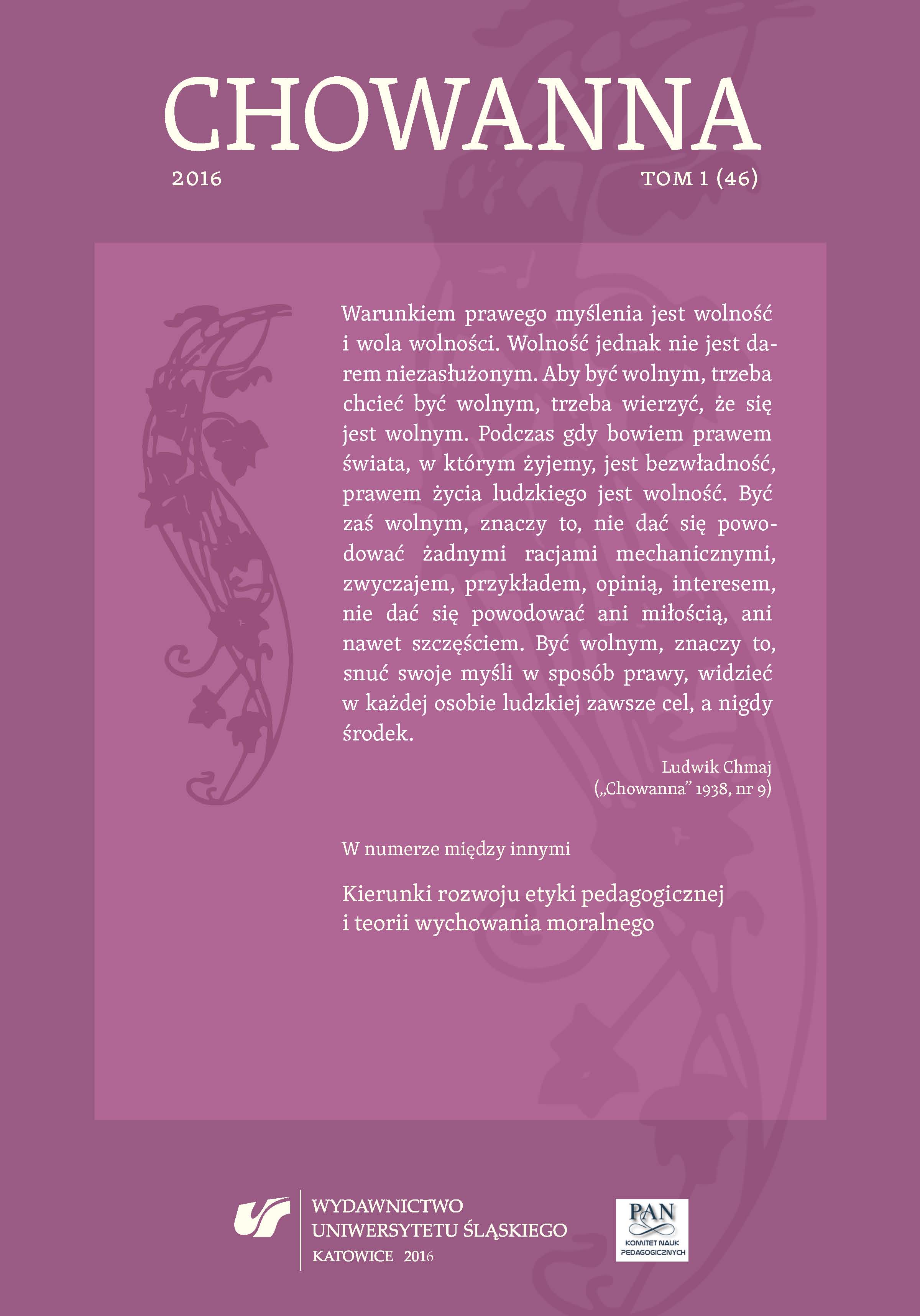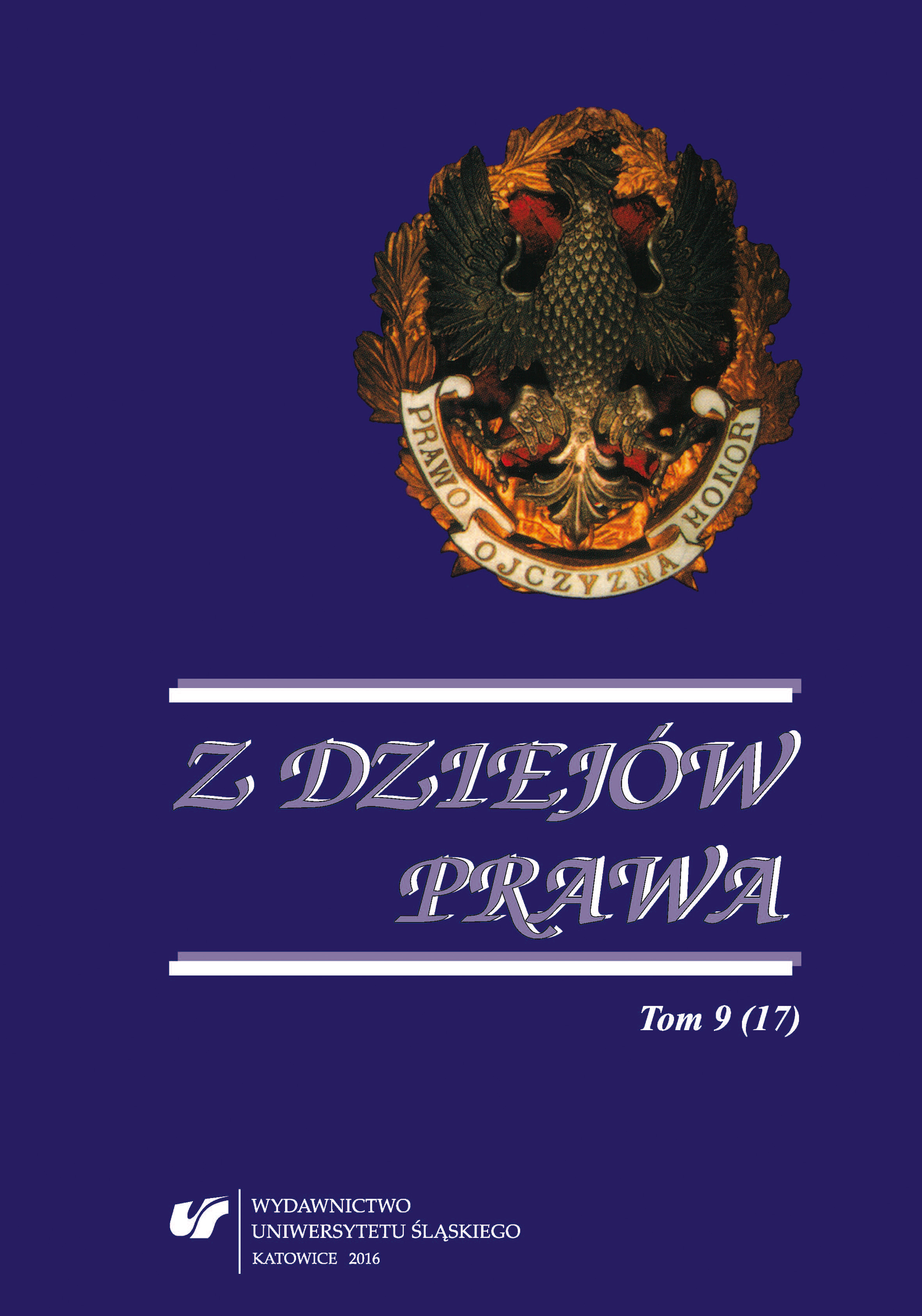



Keywords: ethical intellectualism; rationalism; moral value; process of moral upbringing; axiological education
The article is of a polemic character; the author criticizes the main assumptions of ethical intellectualism, especially the statement that a person’s moral behavior is closely affected by his or her knowledge of moral values. According to the author such beliefs lead to one-sided commitment of the students’ mental sphere in the present-day school. The author puts forward several theses, which she elaborates on in the text, including the following: ethical intellectualism, disregarding the importance of human will, emotions and feelings has significantly hampered the proper process of moral upbringing of subsequent generations and replaced it with axiological education. The author presents numerous examples of ethical intellectualism, which has dominated the Polish school, e.g. the student is perceived as a learning subject, less often as a subject experiencing a variety of emotions or feelings; the school infrastructure is relatively well suited to fulfill its didactic function but less so to carry out its upbringing functions; especially neglected here is the introception of values in students. The author is of the opinion that privileged pedagogical categories should include, among others, the upbringing situation and the atmosphere of upbringing, both of which facilitate the process of adopting proper moral attitudes by children and the youth.
More...
Keywords: ethics; education; educational experience; pedagogical ethics
The paper explores the problematic character of the relationship between ethics and education. The key concept that is analyzed and interpreted is pedagogical ethics. The author raises question on the actual meaning of the term and suggests that not every conception of pedagogical ethics can be really productive in a positive sense in the contemporary educational practice. The term is interpreted in two perspectives that derive from other philosophical concepts. The first comes from the concept of spiritual man, suggested by the Czech philosopher, Jan Patočka. The other originates from Michael Oakeshott’s concept of conversation of humankind. The final part consists of some thoughts concerning the influence of ethics on understanding of educational experience.
More...
Keywords: gender role; division of roles; social change; dilemma
The modern family finds itself facing a variety of ever-changing circumstances which greatly inhibit the selection of clearly defined roles or behaviours intent on bringing about the good of the whole family. The article describes three models which regulate the roles taken upon individuals within the family. The text defines the optimal method of creating one’s own role in the family as one which would allow for the simultaneous consideration of the variety of possibilities and needs of all family members.
More...
Keywords: pedagogical ethics; inclusive education; accessibility; person with disabilities; early childhood education; awareness-raising; human dignity
Pedagogical ethics is the foundation for any discussion of education. Starting from this ethical discourse we can take actions on the basis of teaching. One of the basic concepts within the scope of pedagogical ethics is the dignity. Human dignity, which after World War II was indicated in international documents as the source of human rights. Poland’s ratification of the UN Convention on the Rights of Persons with Disabilities faces our country with the bulk of the commitments, the performance of which is to ensure the full realization of human rights and freedoms of this group of people. One of the commitments is to raise public awareness concerning rights of persons with disabilities. The article is devoted to one of many areas in which this process should take place, namely early childhood education, and exactly content of the free textbooks.
More...
Keywords: values; education; education in the values; educator
The article is an element in the debate on the value preferred by modern man operating in the post-modern social reality. It is an attempt debate on the future educators declared values and thoughts related to the implications of their educational influence on the young generation of Polish people. Among the many important aspects of the issue of values as a key concept of education assigned a value. Were also highlighted issues concerning the hierarchy of values, the classification of the value and the importance of teacher / educator in the educational process. I made an attempt to analyze compatibility with the values declared by educators to designated, current, civilizational values of clarifying the goals of education.
More...
Keywords: ethical standard; cheating at school; honesty; motives for cheating on school tests
The paper introduces the issue of cheating in polish school. 1 070 students of polish high-schools were examined. The purpose of the study was to establish: frequency of cheating in polish school, its motives and deterring factors as well as preferred by students methods of cheating. The conducted study included the consequences of the phenomenon – preferred teachers reactions on cheating and perceptions of their real reactions, as well as feelings after cheating and the perception of victims of cheating. The results are presented.
More...
Keywords: contemplative pedagogy; spirituality; integrative education; holism
This article is part of the project regarding traces of the presence of the category of spirituality in education. The aim of the present text is to introduce the concept of contemplative education, which in Polish literature is little known to the mainstream pedagogy. Contemplative pedagogy refers to the category of spirituality in a specific way. It initiates a significant change whereby spirituality becomes a living category in the process of education, it ceases to work in the pedagogical discourse as a concept which is vague and not very clear, and is addressed in the area of educational practice.
More...
Keywords: education; andragogy; knowledge; biography; learning from life; lifelong learning; the table
The author has tried to describe the experience of biographical and education related to one of the most important furniture everyday, which is the table. This furniture mainly related to the preparation and consumption of food, it is also an opportunity to learn, to meetings, talks and strengthening relationships. The table is also very often a “witness” the first lessons of adulthood, which take place in childhood, while having fun. The author also appeared in the text of the role and importance of the table in the perception of students of pedagogy.
More...
Keywords: social support; eating disorders; anorexia nervosa; bulimia nervosa; parents; friends
The aim of this paper is to make a quick overview of the literature concerning the role of social support for patients with anorexia and bulimia nervosa rendered by relatives and friends. On this background authors’ own qualitative research on this topic is presented with the main focus on the perception of such a support from different perspectives. The paper examines the perception of social support by patients and experience of parents and friends’ in giving support to them. Participants in this study were 13 individuals representing the following groups: patients with eating disorders and parents and friends of those who suffer. They were interviewed using a structured interview. The obtained results confirmed the hypothesis that support from relatives and friends in eating disorders treatment is important, but also showed difficulties parents and friends may have in giving support. Moreover, the findings confirm the need of educating the whole family and friends of patients (with eating disorders) in more effective support.
More...
Keywords: moral disengagement; academic dishonesty; morality
The article discusses the role of mechanism of moral disengagement in the context of moral behaviour intents. A sample of 244 university students from Silesia participated. The analyses are conducted in the context of the tendency towards different forms of moral disengagement. The results demonstrate that students of different moral disengagement level differ in terms of intentions for dishonest behaviour at the university and in the future work and in their reaction for academic dishonesty of others. The direction of the future research was shown.
More...
Keywords: meaning of life; health; pedagogy of health; existential condition
The article examines diverse determinants of the human existential and health condition considering the interdisciplinary paradigm of health and disease and the perspective of social sciences. The category of the meaning of life, constituting the predictor of health, has been presented from the view of psychological analyses (including the conceptions of Viktor Frankl), conceptions of health and existential deficits resulting in, among other things, risks of suicidal behaviour.
More...
The issue of the poor state of the armed forces as well as the army reform in the Polish‑Lithuanian Commonwealth remained one of the primary topics of political debate in the 18th century. Wincenty Skrzetuski, a prominent teacher, historian, lawyer and political writer of the era, also contributed significantly to the discussion. His reflections on the state of the Polish army, collected in his seminal work, “The Political Law of the Polish Nation”, published in 1782—1784, were mostly educational and historical in nature and referred to Gottfried Lengnich’s “Ius publicum Regni Poloniae”. Additionally, Skrzetuski, in his description of the poor state of the Polish army, postulated a series of changes, including the idea of basing the system of the armed forces on the so‑called national army and a strong contingent of professional forces. Skrzetuski’s postulates were not as precise as those formulated by his successors, such as Stanisław Staszic or Hugo Kołłątaj, but they still constituted an important voice in the debate and pointed to the necessity of change, in the spirit of reformation and the Enlightenment, where the absolutist army was increasingly contrasted with a national army.
More...
The article is devoted to the economic doctrine of individualist anarchism, also referred to as capitalist anarchism. The essay is divided into three parts. The first part presents the sources and basic premises of the doctrine. The author discusses both the economic (A. Smith’s classical liberalism) and the philosophical (M. Stirner’s egoism) foundations. The second part entails an analysis of social and economic views of two thinkers: J.C. Bastiat and M. Friedman. The contributions of both thinkers are particularly valuable, since they do not limit themselves to simple analysis of the boundaries of acceptable activity on the part of the state in the economic sector, but also are able to translate those reflections into the language of the legal system. The third part of the article focuses on the juxtaposition of the axiology of individualist anarchism with theories of justice. The author pays particular attention to the concepts of material and procedural (formal) justice. Taking the above into account, the author attempts to answer the question as to which of the discussed conceptions of justice can be regarded as the most adequate to the cultural conditions in postmodern societies.
More...
Customs duty constituted one of the public tributes regulating international trade after regaining independence by Poland in 1918. The independent character of the customs duty was emphasised not only by the character of the regulations in customs law, but also by the existence of a specialised branch of public administration devoted to its collection. Customs duty performed a fiscal function and constituted an instrument of protection against inundation of the Polish market by cheap commodities imported from abroad.
More...


